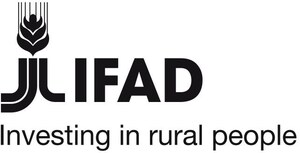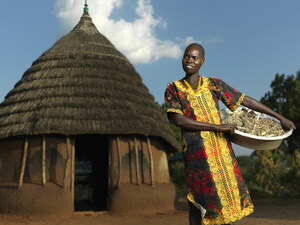ROME, Jan. 22, 2021 /PRNewswire/ -- If investments to help rural small-scale farmers adapt to climate change do not substantially increase, we risk widespread hunger and global instability, warned Gilbert F. Houngbo, President of the International Fund for Agricultural Development (IFAD), ahead of the Climate Adaptation Summit next week.
"It is unacceptable that small-scale farmers who grow much of the world's food are left at the mercy of unpredictable weather patterns, with such low investment to help them to adapt," said Houngbo. "They do little to cause climate change, but suffer the most from its impacts. Their increasingly common crop failures and livestock deaths put our entire food system at risk. It is imperative that we ensure they remain on their land and sustainably produce nutritious food. If not, then hunger, poverty and migration will become even more widespread in the years to come."
In response, Houngbo will announce the launch of IFAD's Enhanced Adaptation for Smallholder Agriculture Programme (ASAP+) at the Climate Adaptation Summit on 26 January, alongside IFAD's Goodwill Ambassadors Idris and Sabrina Elba who will discuss the topic with Alexander de Croo, Prime Minister of Belgium, and Dag Inge Ulstei, Norway's Minister of International Development.
Only 1.7 percent of global climate finance – a fraction of what is needed - goes to small-scale farmers in developing countries despite their disproportionate vulnerability to the impacts of climate change, according to a report released by IFAD at the end of 2020.
ASAP+ intends to change this. It is envisioned to be the largest fund dedicated to channelling climate finance to small-scale producers. It aims to mobilise US$500 million to reduce climate change threats to food security, lower greenhouse gases and help more than 10 million people adapt to weather changes. It will also help countries achieve their nationally determined contributions set under the Paris agreement. Austria, Germany, Ireland and Qatar have already pledged commitments.
Small-scale farmers currently produce half of the world's food calories, but are often entirely reliant on natural resources, including rain. As a result, they are at significant risk from increasing temperatures, erratic rainfall, pest infestations, rising sea levels, and extreme weather events.
Note to the editor:
Follow the event: 26 January 09:30-11:30 CET CAS Channel 4. Register here or follow CAS YouTube channel.
Contact: Antonia Paradela - [email protected] - Mobile: +34 605398109 www.ifad.org
SOURCE International Fund for Agricultural Development

Related Links
WANT YOUR COMPANY'S NEWS FEATURED ON PRNEWSWIRE.COM?
Newsrooms &
Influencers
Digital Media
Outlets
Journalists
Opted In






Share this article